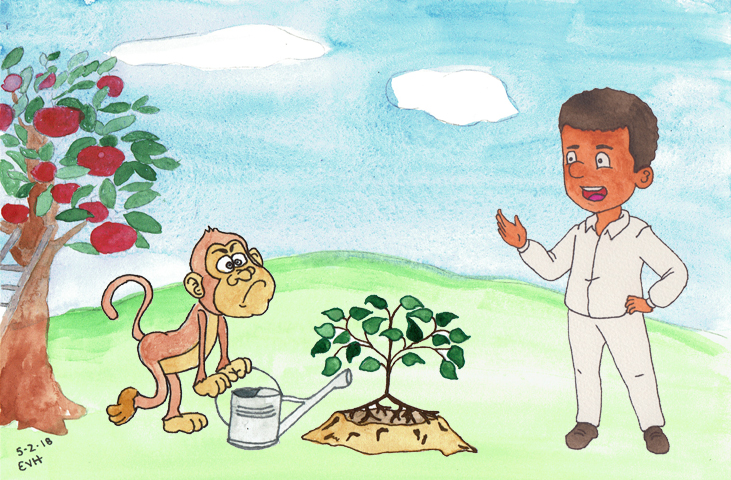
Jataka 268
Ārāma Dūsa Jātaka
The Barren Garden
as told by Eric Van Horn
originally translated by William Henry Denham Rouse, Cambridge University
originally edited by Professor Edward Byles Cowell, Cambridge University
Wisdom—or the lack thereof—is a common theme in the Buddha’s teaching. And some foolishness simply follows you from one lifetime into the next!
Note that this story is almost identical to Jātaka 46, The Garden Spoiler.
“Best of all.” The Master told this story while living in the country near Dakkhiṇāgiri. (Dakkhiṇāgiri is a town that lay on the road between Sāvatthi and Rājagraha, the capital cities of the two largest empires in India at that time.) It is about a gardener’s son.
After the rains retreat (Vassa), the Master left Jetavana and went on an alms pilgrimage in the district near Dakkhiṇāgiri. A layman invited the Buddha and his company to visit. He had them sit down in his grounds while he gave them rice and cakes. Then he said, "If any of the monks care to see the grounds, they might go along with the gardener.” And he ordered the gardener to supply them with any fruit they might want.
By and bye they came upon a bare spot. “What is the reason,” they asked, “that this spot is bare and treeless?” “The reason is,” answered the gardener, “that a certain gardener’s son, who had to water the saplings, thought he had better give them water in proportion to the length of the roots. So he pulled them all up to see them and watered them accordingly. The result was that the place became bare.”
The monks returned and told this to their Master. He said, “Not only now has the lad destroyed a plantation. He did just the same before.” And then he told them this story from the past.
Once upon a time, when a King named Vissasena was reigning over Benares, he proclaimed a holiday. The park keeper thought he would celebrate the holiday. So he summoned the monkeys that lived in the park and said, “This park is a great blessing to you. I want to take a week’s holiday. Will you water the saplings while I am gone?” “Oh, yes,” they said. He gave them the watering skins and went his way.
The monkeys drew water and began to water the roots.
The eldest monkey cried out, “Wait, now! It’s hard to get water these days. We must be careful with it. Let us pull up the plants and see the length of their roots. If they have long roots, they need plenty of water;. But if they have short ones, they only need a little.” “True, true," they agreed. Then some of them pulled up the plants while others put them back again and then watered them.
The Bodhisatta at the time was a young gentleman living in Benares. Some business took him to this park, and he saw what the monkeys were doing.
“Who told you to do that?” he asked.
“Our chief,” they replied.
“If that is the wisdom of your leader, what must the rest of you be like!” he said. And to explain the matter, he uttered the first stanza:
“Best of all the troop is this,
What intelligence is his!
If he was chosen as the best,
What sort of creatures are the rest!”

Figure: What intelligence is his!
Hearing this remark, the monkeys replied with the second stanza:
“Brahmin, you know not what you say
Blaming us in such a way!
If the root we do not know,
How can we tell the trees that grow?”
To which the Bodhisatta replied in the third stanza as follows:
“Monkeys, I have no blame for you,
Nor those who range the woodland through.
The monarch is a fool to say
‘Please tend my trees while I’m away.’”
When this discourse ended, the Master identified the birth: “The lad who destroyed the park was the monkey chief, and I was the wise man.”
